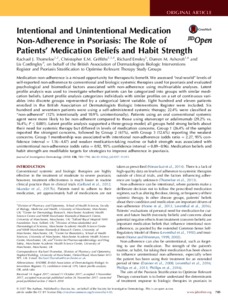THORNELOE, Rachael, GRIFFITHS, Christopher EM, EMSLEY, Richard, ASHCROFT, Darren M, CORDINGLEY, Lis, BARKER, Jonathan, BENHAM, Marilyn, BURDEN, David, EVANS, Ian, GRIFFITHS, Christopher, HUSSAIN, Sagair, KIRBY, Brian, LAWSON, Linda, MASON, Kayleigh, MCELHONE, Kathleen, MURPHY, Ruth, ORMEROD, Anthony, OWEN, Caroline, REYNOLDS, Nick, SMITH, Catherine, WARREN, Richard, BARKER, Jonathan, BARNES, Michael, BURDEN, David, EMSLEY, Richard, GRIFFITHS, Christopher, PAYNE, Katherine, REYNOLDS, Nick, RYDER, Samantha, SMITH, Catherine, STOCKEN, Deborah and WARREN, Richard
(2018).
Intentional and unintentional medication non-adherence in psoriasis: The role of patients’ medication beliefs and habit strength.
Journal of investigative dermatology, 138 (4), 785-794.
[Article]
Documents
24449:529058
![[thumbnail of Thorneloe JID.pdf]](https://shura.shu.ac.uk/24449/1.hassmallThumbnailVersion/Thorneloe%20JID.pdf)

Preview
Abstract
Medication non-adherence is a missed opportunity for therapeutic benefit. We assessed “real-world” levels of self-reported non-adherence to conventional and biologic systemic therapies used for psoriasis and evaluated psychological and biomedical factors associated with non-adherence using multivariable analyses. Latent profile analysis was used to investigate whether patients can be categorized into groups with similar medication beliefs. Latent profile analysis categorizes individuals with similar profiles on a set of continuous variables into discrete groups represented by a categorical latent variable. Eight hundred and eleven patients enrolled in the British Association of Dermatologists Biologic Interventions Register were included. Six hundred and seventeen patients were using a self-administered systemic therapy; 22.4% were classified as “non-adherent” (12% intentionally and 10.9% unintentionally). Patients using an oral conventional systemic agent were more likely to be non-adherent compared to those using etanercept or adalimumab (29.2% vs. 16.4%; P ≤ 0.001). Latent profile analysis supported a three-group model; all groups held strong beliefs about their need for systemic therapy but differed in levels of medication concerns. Group 1 (26.4% of the sample) reported the strongest concerns, followed by Group 2 (61%), with Group 3 (12.6%) reporting the weakest concerns. Group 1 membership was associated with intentional non-adherence (odds ratio = 2.27, 95% confidence interval = 1.16−4.47) and weaker medication-taking routine or habit strength was associated with unintentional non-adherence (odds ratio = 0.92, 95% confidence interval = 0.89−0.96). Medication beliefs and habit strength are modifiable targets for strategies to improve adherence in psoriasis.
Actions (login required)
 |
View Item |



 Tools
Tools Tools
Tools